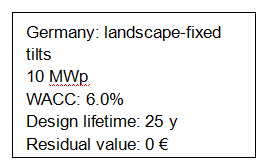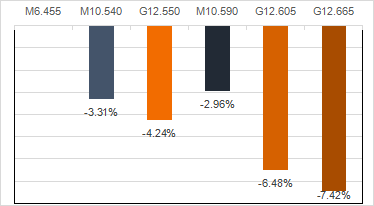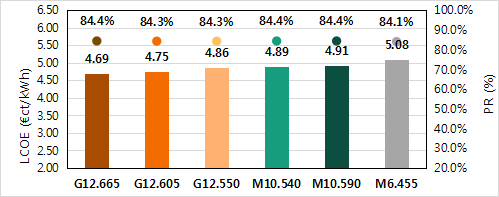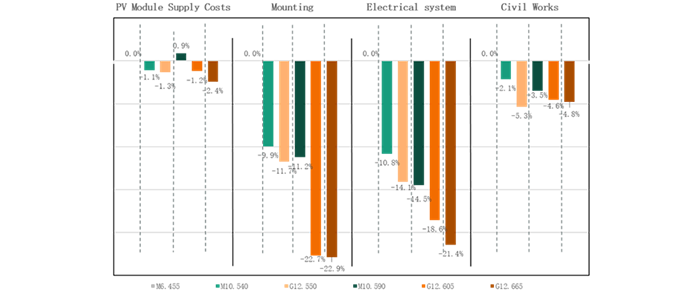Fraunhofer ISE studyⅠ: Vertex 670W’s LCOE reduced by 7.4%, Trina Solar 210 mono-facial modules with fixed tilts demonstrate outstanding system value in Germany
Since the launch of the 600W+ series, world leading design institutes and well-known third-party organizations have evaluated and studied the LCOE advantage and value of Vertex modules. Recently, Fraunhofer ISE, the world leading solar institution, has completed the assessment of CAPEX and LCOE of new generation of ultra-high power modules 210mm (G12) from Trina Solar and 182mm (M10) series from other manufacturer.
Founded in 1981, Fraunhofer ISE is the largest solar research institute in Europe. Based in Freiburg, Germany, it is a constituent entity of Fraunhofer-Gesellschaft, the world’s leading applied research organization. Headquartered in Munich, Germany, Fraunhofer has more than 20,000 qualified scientists and engineers in 74 institutes and research institutions worldwide.
The study results show that the new generation of 210mm (G12) and 182mm (M10) modules perform better than the conventional 166mm (M6) modules in both CAPEX and LCOE, while the M10 540W mono-facial modules are superior to the M10 585W mono-facial modules.
It is also found that among the G12 modules represented by Trina Solar’s Vertex series, the 550W, 600W and 670W modules are superior to the M10 modules in both CAPEX and LCOE. The CAPEX of the Vertex G12 670W is 4.2% lower than that of the M10 540W modules, and the LCOE is 4.1% lower than the latter. The LCOE of the Vertex G12 670W is 4.5% lower than that of the M10 585W modules, and is up to 7.4% lower than that of the M6 455W modules.
In the era of grid parity, the advanced Vertex 210mm series of modules have a prominent edge in Levelized Cost of Energy (LCOE).
Assessment site: Germany
Module types: M6 mono-facial 455W module, M10 mono-facial 540W module, 590W module as well as G12 mono-facial 550W, 600W and 670W module
Method of installation: Fixed-tilts (landscape)
Inverter: String inverter
The assessment took place in a typical photovoltaic site in Germany for design input.

Figure I: Assessment parameters
Results: The new generation of high-power modules performs better than the M6 modules in both CAPEX and LCOE; G12 performs better than M10, and M10 performs better than M6. In particular, the costs of trackers and electrical systems of M10 and G12 are significantly lower than other modules.
1. The Vertex G12 modules have the best CAPEX and LCOE. Compared to the M10 modules, the G12 600W and 670W modules perform particularly well, reducing CAPEX by up to 1.5-2 €cWp and LCOE by up to 3-4.5%. Compared to the M6 modules, the LCOE could be reduced by 6.5%-7.4%.


Figure II: Calculation results of CAPEX

Figure III: Calculation results of LCOE
2. The superior performance of the G12 600W and 670W modules is largely due to savings of the costs of trackers, which are up to around 0.5~1€c/Wp or 11% compared to the M10 series.
3. Thanks to the innovative design concept of low-voltage and high-string power of the G12 modules, the 210mm 550W, 600W and 670W modules have excellent performance in savings of the costs of electrical systems, which are up to approximately 14.1~21.4% compared to the M6 series.
4. Another reason for the superior performance of the G12 600W and 670W modules lies in their lower transportation costs. Within the same 40-foot container, the power of loadable G12 600W and 670W modules can be increased by about 12%.

Figure IV: Comparison of items of CAPEX research results
The comparisons show that the G12 series of ultra-high power modules represented by Trina Solar’s Vertex can significantly reduce CAPEX, LCOE in particular, thanks to their low-voltage, high string power design and superbly efficient power generation capacity. Compared to conventional modules, the single string power is significantly boosted by 36%. In turn, it can save the material and labor costs of DC terminals, thus lowering the initial investment and significantly saving the system’s BOS cost and LCOE.
Always driven by innovative, reliable quality and customer value, Trina Solar’s high-power, high-efficiency modules are getting inevitably popular in the era of grid parity.
